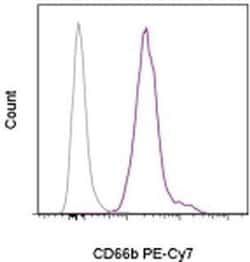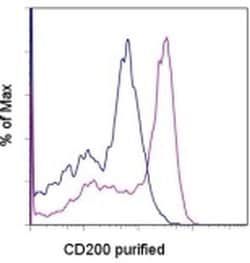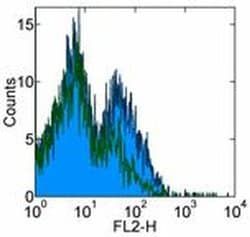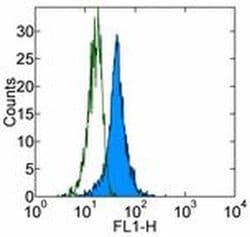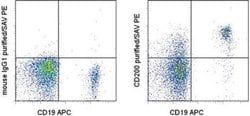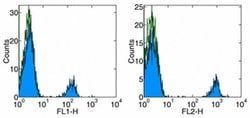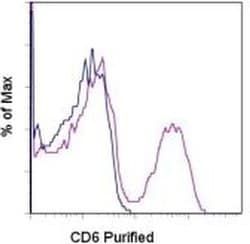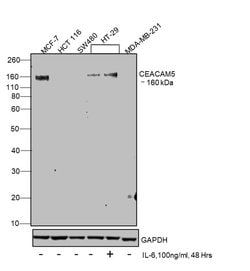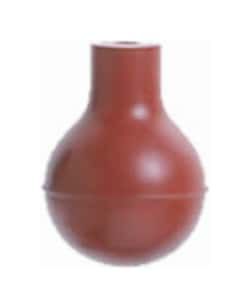14-066-937
CD66e (CEA) Monoclonal Antibody (CB30), eBioscience™, Invitrogen™
Manufacturer: Invitrogen
Select a Size
| Pack Size | SKU | Availability | Price |
|---|---|---|---|
| Each of 1 | 14-066-937-Each-of-1 | In Stock | ₹ 1,22,108.00 |
14-066-937 - Each of 1
In Stock
Quantity
1
Base Price: ₹ 1,22,108.00
GST (18%): ₹ 21,979.44
Total Price: ₹ 1,44,087.44
Antigen
CD66e (CEA)
Classification
Monoclonal
Concentration
0.5 mg/mL
Formulation
PBS with 0.09% sodium azide; pH 7.2
Gene Accession No.
P06731
Gene Symbols
Ceacam5
Purification Method
Affinity chromatography
Regulatory Status
RUO
Gene ID (Entrez)
1048
Content And Storage
4° C
Form
Liquid
Applications
Flow Cytometry, Immunocytochemistry, Immunohistochemistry (Paraffin), Western Blot
Clone
CB30
Conjugate
Unconjugated
Gene
Ceacam5
Gene Alias
1600029H12Rik; Carcinoembryonic antigen; carcinoembryonic antigen related cell adhesion molecule 5; carcinoembryonic antigen-related cell adhesion molecule 5; CD66e; CEA; CEACAM5; Meconium antigen 100; OTTHUMP00000199033; pregnancy-specific glycoprotein 30; Psg30; sCD66e; soluble CD66e
Host Species
Mouse
Quantity
2 mg
Primary or Secondary
Primary
Target Species
Human
Product Type
Antibody
Isotype
IgG1 κ
Description
- Description: The monoclonal antibody CB30 recognizes human CD66e, also known as CEA (carcinoembryonic antigen) and CEACAM5
- As a member of the immunoglobulin superfamily, it is large GPI-linked glycosylated protein with a molecular weight about 200 kDa
- It is expressed mainly on epithelial cells and on a variety of tumors of the gastrointestinal, respiratory and genitourinary tracts
- CD66e has been shown to function in cell adhesion and migration via homophilic and heterophilic interactions with NCA (non-specific cross-reacting antigen also known as CEACAM6 and CD66c)
- Overexpression is correlated with tumor invasiveness and is therefore used as a clinical marker
- Applications Reported: This CB30 antibody has been reported for use in flow cytometric analysis, immunoblotting (WB), and immunohistochemical staining
- Applications Tested: This CB30 antibody has been tested by immunohistochemistry and by western blot on cell lysates prepared from MCF7 cells
- This antibody can be used at less than or equal to 1 μg/mL for immunoblotting and less than 10 μg/mL for IHC
- It is recommended that this antibody be carefully titrated for optimal performance in the assay of interest
- Purity: Greater than 90%, as determined by SDS-PAGE
- Aggregation: Less than 10%, as determined by HPLC
- Filtration: 0.2 μm post-manufacturing filtered
- CEA (Carcino Embryonic Antigen, CD66e) is synthesized during development in the fetal gut, and re-expressed in increased amounts in intestinal carcinomas and several other tumors
- CEA is a member of carcinoembryonic antigens, immunoglobulin supergene family and consists of a single N domain (structural homology to the immunoglobulin variable) and six immunoglobulin constant-like A (A1, A2, A3) and B domains (B1, B2, B3)
- Antibodies to CEA are useful in identifying the origin of various metastatic adenocarcinomas and in distinguishing pulmonary adenocarcinomas (60 to 70% are CEA+) from pleural mesotheliomas (rarely or weakly CEA+)
- CEA is a member of a large family of glycoproteins, a useful tumor marker for adenocarcinoma, and found in adenocarcinomas of endodermally derived digestive system epithelium and fetal colon
- Two subgroups of the CEA family, the CEA cell adhesion molecules and the pregnancy-specific glycoproteins, are located within a 1.2 Mb cluster on the long arm of chromosome 19
- Eleven pseudogenes of the CEA cell adhesion molecule subgroup are also found in the cluster
- CEA was originally described in bile ducts of liver as biliary glycoprotein
- Subsequently, CEA was found to be a cell-cell adhesion molecule detected on leukocytes, epithelia, and endothelia
- The encoded protein mediates cell adhesion via homophilic as well as heterophilic binding to other proteins of the subgroup
- Multiple cellular activities have been attributed to the encoded protein, including roles in the differentiation and arrangement of tissue three-dimensional structure, angiogenesis, apoptosis, tumor suppression, metastasis, and the modulation of innate and adaptive immune responses
- Multiple transcript variants encoding different isoforms have been reported, but the full-length nature of all variants has not been defined.
Compare Similar Items
Show Difference
Antigen: CD66e (CEA)
Classification: Monoclonal
Concentration: 0.5 mg/mL
Formulation: PBS with 0.09% sodium azide; pH 7.2
Gene Accession No.: P06731
Gene Symbols: Ceacam5
Purification Method: Affinity chromatography
Regulatory Status: RUO
Gene ID (Entrez): 1048
Content And Storage: 4° C
Form: Liquid
Applications: Flow Cytometry, Immunocytochemistry, Immunohistochemistry (Paraffin), Western Blot
Clone: CB30
Conjugate: Unconjugated
Gene: Ceacam5
Gene Alias: 1600029H12Rik; Carcinoembryonic antigen; carcinoembryonic antigen related cell adhesion molecule 5; carcinoembryonic antigen-related cell adhesion molecule 5; CD66e; CEA; CEACAM5; Meconium antigen 100; OTTHUMP00000199033; pregnancy-specific glycoprotein 30; Psg30; sCD66e; soluble CD66e
Host Species: Mouse
Quantity: 2 mg
Primary or Secondary: Primary
Target Species: Human
Product Type: Antibody
Isotype: IgG1 κ
Antigen:
CD66e (CEA)
Classification:
Monoclonal
Concentration:
0.5 mg/mL
Formulation:
PBS with 0.09% sodium azide; pH 7.2
Gene Accession No.:
P06731
Gene Symbols:
Ceacam5
Purification Method:
Affinity chromatography
Regulatory Status:
RUO
Gene ID (Entrez):
1048
Content And Storage:
4° C
Form:
Liquid
Applications:
Flow Cytometry, Immunocytochemistry, Immunohistochemistry (Paraffin), Western Blot
Clone:
CB30
Conjugate:
Unconjugated
Gene:
Ceacam5
Gene Alias:
1600029H12Rik; Carcinoembryonic antigen; carcinoembryonic antigen related cell adhesion molecule 5; carcinoembryonic antigen-related cell adhesion molecule 5; CD66e; CEA; CEACAM5; Meconium antigen 100; OTTHUMP00000199033; pregnancy-specific glycoprotein 30; Psg30; sCD66e; soluble CD66e
Host Species:
Mouse
Quantity:
2 mg
Primary or Secondary:
Primary
Target Species:
Human
Product Type:
Antibody
Isotype:
IgG1 κ
Antigen: CD68
Classification: Monoclonal
Concentration: 0.5 mg/mL
Formulation: PBS with 0.09% sodium azide; pH 7.2
Gene Accession No.: P34810
Gene Symbols: Cd68
Purification Method: Affinity chromatography
Regulatory Status: RUO
Gene ID (Entrez): 968
Content And Storage: 4° C
Form: Liquid
Applications: Flow Cytometry, Immunocytochemistry, Immunohistochemistry (Frozen)
Clone: eBioY1/82A (Y1/82A)
Conjugate: Unconjugated
Gene: Cd68
Gene Alias: CD68; CD68 antigen; CD68 molecule; GP110; Lamp4; macrophage antigen CD68; macrosialin; Scard1; scavenger receptor class D, member 1; similar to CD68 antigen
Host Species: Mouse
Quantity: 2 mg
Primary or Secondary: Primary
Target Species: Human
Product Type: Antibody
Isotype: IgG2b κ
Antigen:
CD68
Classification:
Monoclonal
Concentration:
0.5 mg/mL
Formulation:
PBS with 0.09% sodium azide; pH 7.2
Gene Accession No.:
P34810
Gene Symbols:
Cd68
Purification Method:
Affinity chromatography
Regulatory Status:
RUO
Gene ID (Entrez):
968
Content And Storage:
4° C
Form:
Liquid
Applications:
Flow Cytometry, Immunocytochemistry, Immunohistochemistry (Frozen)
Clone:
eBioY1/82A (Y1/82A)
Conjugate:
Unconjugated
Gene:
Cd68
Gene Alias:
CD68; CD68 antigen; CD68 molecule; GP110; Lamp4; macrophage antigen CD68; macrosialin; Scard1; scavenger receptor class D, member 1; similar to CD68 antigen
Host Species:
Mouse
Quantity:
2 mg
Primary or Secondary:
Primary
Target Species:
Human
Product Type:
Antibody
Isotype:
IgG2b κ
Antigen: CD69
Classification: Monoclonal
Concentration: 0.5 mg/mL
Formulation: PBS with 0.09% sodium azide; pH 7.2
Gene Accession No.: Q07108
Gene Symbols: CD69
Purification Method: Affinity chromatography
Regulatory Status: RUO
Gene ID (Entrez): 969
Content And Storage: 4° C
Form: Liquid
Applications: Flow Cytometry, Immunohistochemistry
Clone: FN50
Conjugate: Unconjugated
Gene: CD69
Gene Alias: 5830438K24Rik; Activation inducer molecule; activation inducer molecule (AIM/CD69); AI452015; AIM; BL-AC/P26; CD69; CD69 antigen; CD69 antigen (p60, early T-cell activation antigen); CD69 molecule; CLEC2C; C-type lectin domain family 2 member C; C-type lectin domain family 2, member C; EA1; early activation antigen CD69; early lymphocyte activation antigen; early T-cell activation antigen p60; GP32/28; leukocyte surface antigen Leu-23; MLR-3; VEA; Very Early Activation Antigen
Host Species: Mouse
Quantity: 2 mg
Primary or Secondary: Primary
Target Species: Human
Product Type: Antibody
Isotype: IgG1 κ
Antigen:
CD69
Classification:
Monoclonal
Concentration:
0.5 mg/mL
Formulation:
PBS with 0.09% sodium azide; pH 7.2
Gene Accession No.:
Q07108
Gene Symbols:
CD69
Purification Method:
Affinity chromatography
Regulatory Status:
RUO
Gene ID (Entrez):
969
Content And Storage:
4° C
Form:
Liquid
Applications:
Flow Cytometry, Immunohistochemistry
Clone:
FN50
Conjugate:
Unconjugated
Gene:
CD69
Gene Alias:
5830438K24Rik; Activation inducer molecule; activation inducer molecule (AIM/CD69); AI452015; AIM; BL-AC/P26; CD69; CD69 antigen; CD69 antigen (p60, early T-cell activation antigen); CD69 molecule; CLEC2C; C-type lectin domain family 2 member C; C-type lectin domain family 2, member C; EA1; early activation antigen CD69; early lymphocyte activation antigen; early T-cell activation antigen p60; GP32/28; leukocyte surface antigen Leu-23; MLR-3; VEA; Very Early Activation Antigen
Host Species:
Mouse
Quantity:
2 mg
Primary or Secondary:
Primary
Target Species:
Human
Product Type:
Antibody
Isotype:
IgG1 κ
Antigen: __
Classification: __
Concentration: __
Formulation: __
Gene Accession No.: __
Gene Symbols: __
Purification Method: __
Regulatory Status: __
Gene ID (Entrez): __
Content And Storage: __
Form: __
Applications: __
Clone: __
Conjugate: __
Gene: __
Gene Alias: __
Host Species: __
Quantity: __
Primary or Secondary: __
Target Species: __
Product Type: __
Isotype: __
Antigen:
__
Classification:
__
Concentration:
__
Formulation:
__
Gene Accession No.:
__
Gene Symbols:
__
Purification Method:
__
Regulatory Status:
__
Gene ID (Entrez):
__
Content And Storage:
__
Form:
__
Applications:
__
Clone:
__
Conjugate:
__
Gene:
__
Gene Alias:
__
Host Species:
__
Quantity:
__
Primary or Secondary:
__
Target Species:
__
Product Type:
__
Isotype:
__
